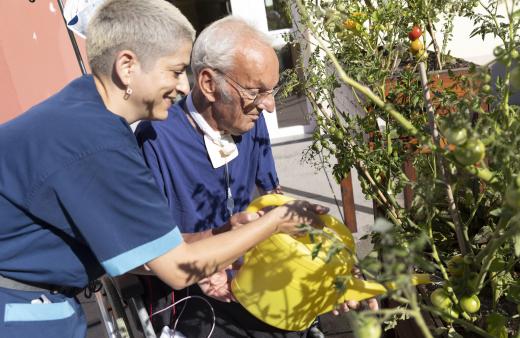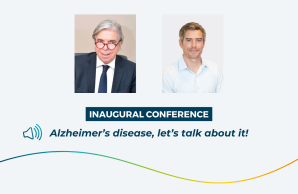Alzheimer’s disease: how to spot the early signs?

Alzheimer’s disease is a progressive neurological disease with multiple disorders. It is the result of a slow degeneration of neurons, starting in the hippocampus and spreading to the rest of the brain. While there is as yet no cure for the disease, we do know that the earlier it is detected, the less quickly it progresses. What are the warning signs of the disease? The teams at Clariane’s Medical Strategy and Healthcare Innovation Department tell you more!
Detecting the early signs of Alzheimer’s disease
Contrary to popular belief, Alzheimer’s disease is not a normal consequence of ageing.
Signs of the onset of Alzheimer’s disease can take several forms (source: Ministry of Health and Prevention, France):
- a change in behaviour and/or personality;
- forgetting recent events;
- misplacing items;
- language problems (common words forgotten or used in place of others);
- difficulty performing familiar tasks;
- loss of spatial and temporal awareness;
- difficulty with abstract reasoning;
- impaired judgement;
- a loss of motivation.
Although these signs do not constitute a diagnosis in themselves, and are not necessarily linked to the onset of the disease, a person experiencing these symptoms, especially if they are frequent, should consult their GP who will carry out initial tests.
If necessary, the person will then be referred to a memory consultation or a specialist doctor (neurologist, geriatrician, psychiatrist). Alzheimer’s disease is diagnosed in several stages and requires a full assessment of cognitive abilities.
World Alzheimer’s Day 2023: the Clariane community takes action! Discover our “Alzheimer’s disease, let’s talk about it!” programme
The importance of early diagnosis
Early diagnosis is a major challenge in the fight against Alzheimer’s disease. Diagnosing the disease as early as possible, by detecting the first signs, makes it possible to:
- anticipate and preserve the quality of life and independence of the patient for as long as possible;
- initiate appropriate and progressive medical and medico-social care, as well as providing support for the person’s family and friends.
So it’s vital to know how to identify the early warning signs!
I have memory loss; do I have Alzheimer’s disease?
“I forget what I just did...”
“I often walk into a room without knowing what I’m looking for...”
“I don’t recognise a document I have written...”
“During a journey close to home, I forget where I’m going...”
One of the most common signs of Alzheimer’s disease is memory loss, particularly forgetting recently learned information. But memory problems are not always a sign of Alzheimer’s disease!
It is the persistence of the signs listed above over several months and their combination that should alert the person or those around them.
Focus on the Group’s expertise
In our 695 care homes, all Clariane teams are committed to supporting each person according to their wishes, habits and abilities.
The Group’s Positive Care approach offers personalised support, centred on respect for the person being cared for, taking into account the individuality of each person, particularly residents living with Alzheimer’s or a related disease.
Positive Care is inspired by the approaches of Maria Montessori and Tom Kitwood, which aim to put the individual back at the centre of our work, whatever their particular needs.
“Everything you do for me, you take away from me!” Maria Montessori
In practical terms, this means:
- getting to know the resident, their needs, desires, habits and life history;
- carrying out an overall assessment when the person arrives at the care facility, which will serve as the basis for building a personalised life plan combining social life and a personalised care plan (shared with the resident and their relatives); based on this assessment, non-drug interventions can be offered to patients to stimulate or stabilise their physical, cognitive or behavioural abilities;
- evaluating whether non-drug interventions could be beneficial to the patient, in particular to stimulate or stabilise physical, cognitive or behavioural capacities;
- adapting living spaces to encourage independence and social interaction;
- regular training for teams on all subjects related to residents living with Alzheimer’s disease;
- helping and supporting relatives of residents with Alzheimer’s disease;
- developing ethical questioning in daily practice.

